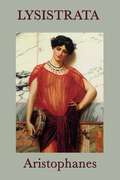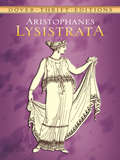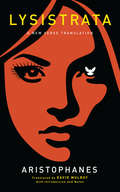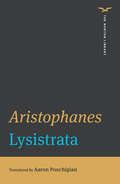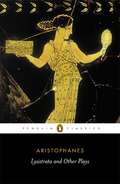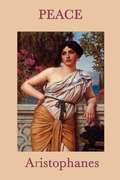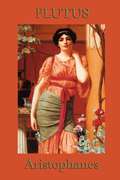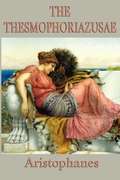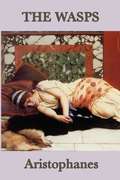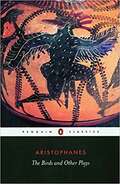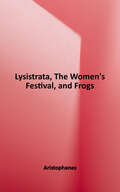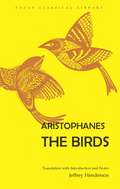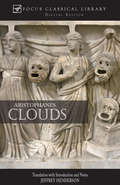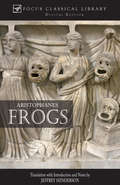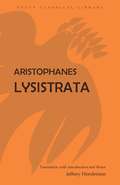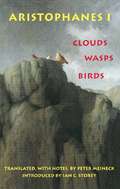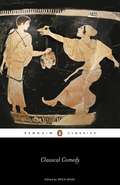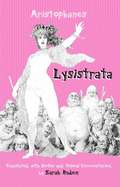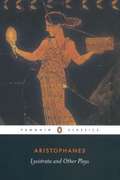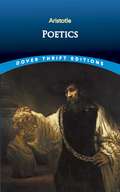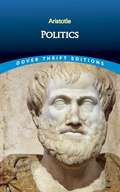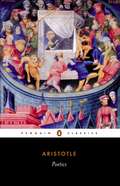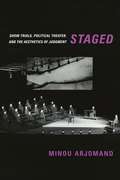- Table View
- List View
Lysistrata
by AristophanesAristophanes' play, Lysistrata, takes place toward the end of the Peloponnesian War and centers on the lives of the soldiers' wives. One woman, Lysistrata, under the impression that a man's libido is ultimately his driving force in life, comes up with an interesting peace solution: to deny their husbands sexual relations until they can settle on a peace agreement that will end the war. However, Lysistrata's strategy effectively creates even more war than before as the sexes begin to feud with each other. Aristophanes' play is both comic and poignant as it reveals the relationship between men and women in classical Athens society.
Lysistrata
by AristophanesFirst presented in 411 B.C., this ancient comedy concerns the efforts of Lysistrata, an Athenian woman, to persuade other woman to join together in a strike against the men of Greece, denying them sex until they've agreed to put down their arms and end the disastrous wars between Athens and Sparta.When the strike begins, and the men respond, the comedic battle of the sexes that ensues makes this spirited play one of the most enjoyable of the classics. In it, Aristophanes employs a mixture of shrewd logic and raffish humor that fully exploits the rich comic potential of the story and its underlying antiwar sentiment. Always a favorite of audiences, Lysistrata, because of its pointed feminist sympathies, is studied and performed today more than ever.
Lysistrata: A New Verse Translation
by AristophanesAristophanes, a native Athenian and the leading exponent of Greek comedy, was born c. 450 BCE. Today forty-three of his plays are known by title; eleven survive. The most famous of these is the whimsical fantasy Lysistrata. A perennial classroom and stage favorite as well as the basis of Spike Lee’s Chi-Raq, the play is as relevant today as it was 2,500 years ago. The premise is simplicity itself: to end the Peloponnesian War, women decide to withhold sex from their husbands until the fighting stops. The play is by turns raucous, bawdy, frantic, and funny. David Mulroy’s exciting new translation retains the original’s verse format, racy jokes, and vibrancy—setting it apart from previous efforts, which are typically reproduced as prose or depart from meaning and meter. His introduction offers a concise summary of Aristophanes’ life and social milieu, including a brief overview of the Peloponnesian War, which took place during the playwright’s lifetime. The appendices include guides on translating meter and Greek pronunciation for aspiring thespians.
Lysistrata: Clouds, Birds, Lysistrata, Women Of The Assembly (The Norton Library #0)
by AristophanesAbout Aaron Poochigian’s translation “Aristophanes was a funny, often obscene social commentator, and he was also a brilliantly fluent, wide-ranging poet, whose lyric rhythms were recited and sung to music, with dancing. It’s very rare for modern translators to convey his poetic virtuosity or make any attempt to bring his meters to life. But Aaron Poochigan has achieved this feat, crafting polymetric translations that convey the whole range of Aristophanes’ larger-than-life characters and provocative, alternative reality scenarios. This new translation is zany, sharp, inventive, vivacious, and surprisingly relevant for our times.” (Emily Wilson, translator of Homer’s Odyssey)
Lysistrata and Other Plays: The Acharnians, The Clouds, Lysistrata
by AristophanesThe Acharnians/The Clouds/Lysistrata'We women have the salvation of Greece in our hands'Writing at a time of political and social crisis in Athens, the ancient Greek comic playwright Aristophanes was an eloquent, yet bawdy, challenger to the demagogue and the sophist. In Lysistrata and The Acharnians, two pleas for an end to the long war between Athens and Sparta, a band of women on a sex strike and a lone peasant respectively defeat the political establishment. The darker comedy of The Clouds satirizes Athenian philosophers, Socrates in particular, and reflects the uncertainties of a generation in which all traditional religious and ethical beliefs were being challenged. Translated with an Introduction and Notes by Alan H. Sommerstein
Peace
by AristophanesA rollicking attack on war-makers, the farmer-hero makes his famous trip to heaven on a dung beetle to discuss the issues with Zeus.
Plutus
by AristophanesThe story of 'Plutus' concerns Chremylus, a poor but just man, who accompanied by his body-servant Cario, consults the Delphic Oracle concerning his son, whether he ought not to be instructed in injustice and knavery and the other arts whereby worldly men acquire riches. By way of answer the god only tells him that he is to follow whomsoever he first meets upon leaving the temple, who proves to be a blind and ragged old man.
The Thesmophoriazusae
by AristophanesThesmophoriazusae was performed in Athens in 411 BCE, most likely at the City Dionysia, and is among the most brilliant of Aristophanes' eleven surviving comedies. It is the story of the crucial moment in a quarrel between the tragic playwright Euripides and Athens' women, who accuse him of slandering them in his plays and are holding a meeting at one of their secret festivals to set a penalty for his crimes. Thesmophoriazusae is a brilliantly inventive comedy, full of wild slapstick humour and devastating literary parody, and is a basic source for questions of gender and sexuality in late 5th-century Athens and for the popular reception of Euripidean tragedy.
The Wasps
by AristophanesWasps satirizes Athenian enthusiasm for jury service and the law courts as well as the city's susceptibility to demagogues.
The Birds and Other Plays
by Aristophanes David Barrett Alan SommersteinOffering a window into the world of ordinary Athenians, Aristophanes' The Birds and Other Plays is a timeless set of comedies, combining witty satire and raucous slapstick to wonderful effect. The plays in this volume all contain Aristophanes' trademark bawdy comedy and dazzling verbal agility <p><p> In The Birds, two cunning Athenians persuade the birds to build the utopian city of 'Much Cuckoo in the Clouds' in the sky, blockading the Olympian gods and installing themselves as new deities. The Knights is a venomous satire on Cleon, a prominent Athenian demagogue, who vies with a humble sausage-seller for the approval of the people; while The Assembly-Women deals with the battle of the sexes as the women of Athens infiltrate the all-male Assembly in disguise. The lengthy conflict with Sparta is the subject of Peace, inspired by the hope of a settlement in 421 BC, and Wealth reflects on the economic catastrophe that hit Athens after the war. <p><p> These lively translations by David Barrett and Alan H. Sommerstein capture the full humour of the plays. The introduction examines Aristophanes' life and times, and the comedy and poetry of his works, and this edition also includes an introductory note for each play. <p><p> For more than seventy years, Penguin has been the leading publisher of classic literature in the English-speaking world. With more than 1,700 titles, Penguin Classics represents a global bookshelf of the best works throughout history and across genres and disciplines. Readers trust the series to provide authoritative texts enhanced by introductions and notes by distinguished scholars and contemporary authors, as well as up-to-date translations by award-winning translators.
Lysistrata, The Women's Festival, and Frogs (Oklahoma Series in Classical Culture #Volume Forty-Two)
by Aristophanes Michael EwansMost readers nowadays encounter the plays of Aristophanes in the classroom, not the theater. Yet the "father of comedy" wrote his plays for the stage, not as literary texts. Many English translations of the plays were written decades ago, and in their outdated language, they fail to capture the dramatic liveliness of the original comedies. Now Michael Ewans offers new and lively translations of three of Aristophanes' finest plays: Lysistrata, The Women's Festival, and Frogs. While remaining faithful to the original Greek, these translations are accessible to a modern audience--and actable on stage. Here readers will discover--in all its uncensored glory--the often raw sexual and scatological language Aristophanes used in his fantastically inventive works. <p><p>This edition also contains all that a reader needs to understand the plays within a broader context. In his comprehensive introduction, Ewans discusses the political and social aspects of Aristophanic comedy, the conventions of Greek theater, and the challenges of translating ancient Greek into modern English. In his theatrical commentaries--a unique feature of this edition--Ewans draws on his own experience of directing the plays in a replica of the original theater. In scene-by-scene analysis, he provides insight into the major issues each play raises in performance. The volume concludes with two glossaries--one of proper names and the other of Greek terms--as well as a bibliography that includes the most recent scholarship on Aristophanic comedy.
The Birds
by Aristophanes Jeffrey HendersonThis is an English translation of Aristophanes’ greatest comedy the Birds and is the story of birds taking control of the government. Includes background material on the historical and cultural context of this work, suggestions for further reading, and notes. Focus Classical Library provides close translations with notes and essays to provide access to understanding Greek culture.
Clouds
by Aristophanes Jeffrey HendersonThis is an English translation of Aristophanes' famous comedy, Clouds, noted for its critique of philosophy, society and education. It includes essays on Old Comedy and the Theater of Dionysus, suggestions for further reading, notes on production, and a map. Focus Classical Library provides close translations with notes and essays to provide access to understanding Greek culture.
Frogs
by Aristophanes Jeffrey HendersonThis is an English translation of Aristophanes' popular comedy in which the god Dionysus seeks to bring the great dramatist Euripides from Hades, where he encounters another great Classical playwright, Aeschylus. Includes background material on the historical and cultural context of this work, suggestions for further reading, and notes. The Focus Classical Library provides close translations with notes and essays to provide access to understanding Greek culture and the roots of contemporary thought.
Lysistrata
by Aristophanes Jeffrey HendersonThis English translation of Aristophanes' most popular comedy will appeal to the modern reader because of its lively and imaginative plot, memorable heroine, good jokes, and appeal for peace and tolerance between nations and between the sexes. This edition includes background material on the historical and cultural context of this work, suggestions for further reading, notes, and a map. The Focus Classical Library provides close translations with notes and essays to provide access to understanding Greek culture and the roots of contemporary thought.
Aristophanes 1: Clouds, Wasps, Birds
by Aristophanes Peter Meineck Ian C. StoreyOriginally adapted for the stage, Peter Meineck's revised translations achieve a level of fidelity appropriate for classroom use while managing to preserve the wit and energy that led The New Yorker to judge his CloudsThe best Greek drama we've ever seen anywhere," and The Times Literary Supplement to describe his Wasps as "Hugely enjoyable and very, very funny. A general Introduction, introductions to the plays, and detailed notes on staging, history, religious practice and myth combine to make this a remarkably useful teaching text.
Classical Comedy: The Comedies Of Aristophanes (Aris And Phillips Classical Texts)
by Aristophanes Menander Plautus TerenceFrom the fifth to the second century BC, innovative comedy drama flourished in Greece and Rome. This collection brings together the greatest works of Classical comedy, with two early Greek plays: Aristophanes' bold, imaginative Birds, and Menander's The Girl from Samos, which explores popular contemporary themes of mistaken identity and sexual misbehaviour; and two later Roman comic plays: Plautus' The Brothers Menaechmus - the original comedy of errors - and Terence's bawdy yet sophisticated double love-plot, The Eunuch. Together, these four plays demonstrate the development of Classical comedy, celebrating its richness, variety and extraordinary legacy to modern drama.
Lysistrata
by Aristophanes Sarah RudenThis rollicking new translation of Aristophanes' comic masterpiece is rendered in blank verse for dialogue and in lyric meters and free verse for the songs. Appended commentary essays--on Athenian democracy, ancient Greek warfare, Athenian women, and Greek Comedy--offer lively and informative discussions not only of Aristophanes, but of the broader fifth-century social, political, and cultural context as well.
Lysistrata and Other Plays
by Aristophanes Alan H. SommersteinThree plays by the comedian of Ancient Greece Writing at the time of political and social crisis in Athens, Aristophanes was an eloquent yet bawdy challenger to the demagogue and the sophist. The Achanians is a plea for peace set against the background of the long war with Sparta. In Lysistrata a band of women tap into the awesome power of sex in order to end a war. The darker comedy of The Clouds satirizes Athenian philosophers, Socrates in particular, and reflects the uncertainties of a generation in which all traditional religious and ethical beliefs were being challenged. <P><P> For more than seventy years, Penguin has been the leading publisher of classic literature in the English-speaking world. With more than 1,700 titles, Penguin Classics represents a global bookshelf of the best works throughout history and across genres and disciplines. Readers trust the series to provide authoritative texts enhanced by introductions and notes by distinguished scholars and contemporary authors, as well as up-to-date translations by award-winning translators.
Poetics (Dover Thrift Editions Ser.)
by AristotleAmong the most influential books in Western civilization, Aristotle's Poetics is really a treatise on fine art. In it are mentioned not only epic and dithyrambic poetry, but tragedy, comedy, and flute and lyre playing. Aristotle's conception of tragedy, i.e. the depiction of a heroic action that arouses pity and fear in the spectators and brings about a catharsis of those emotions, has helped perpetuate the Greek ideal of drama to the present day. Similarly, his dictums concerning unity of time and place, the necessity for a play to have a beginning, middle, and end, the idea of the tragic flaw and other concepts have had enormous influence down through the ages.Throughout the work, Aristotle reveals not only a great intellect analyzing the nature of poetry, music, and drama, but also a down-to-earth understanding of the practical problems facing the poet and playwright. Now, in this inexpensive edition of the Poetics, readers can enjoy the seminal insights of one of the greatest minds in human history as he sets about laying the foundations of critical thought about the arts.
Poetics: A Treatise On Government (Dover Thrift Editions)
by AristotleAmong the most influential books in Western civilization, the Poetics is really a treatise on fine art. It offers seminal ideas on the nature of drama, tragedy, poetry, music, and more, including such concepts as catharsis, the tragic flaw, unities of time and place and other rules of drama. This inexpensive edition enables readers to enjoy the critical insights of one humanity's greatest minds laying the foundations for thought about the arts.
Poetics
by AristotleOne of the most powerful, perceptive and influential works of criticism in Western literary history In his near-contemporary account of classical Greek tragedy, Aristotle examines the dramatic elements of plot, character, language and spectacle that combine to produce pity and fear in the audience, and asks why we derive pleasure from this apparently painful process. Taking examples from the plays of Aeschylus, Sophocles and Euripides, the Poetics introduced into literary criticism such central concepts as mimesis ('imitation'), hamartia ('error') and katharsis ('purification'). Aristotle explains how the most effective tragedies rely on complication and resolution, recognition and reversals. The Poetics has informed thinking about drama ever since.Translated with an Introduction and Notes by Malcolm Heath
Staged: Show Trials, Political Theater, and the Aesthetics of Judgment
by Minou ArjomandTheater requires artifice, justice demands truth. Are these demands as irreconcilable as the pejorative term “show trials” suggests? After the Second World War, canonical directors and playwrights sought to claim a new public role for theater by restaging the era’s great trials as shows. The Nuremberg trials, the Eichmann trial, and the Auschwitz trials were all performed multiple times, first in courts and then in theaters. Does justice require both courtrooms and stages?In Staged, Minou Arjomand draws on a rich archive of postwar German and American rehearsals and performances to reveal how theater can become a place for forms of storytelling and judgment that are inadmissible in a court of law but indispensable for public life. She unveils the affinities between dramatists like Bertolt Brecht, Erwin Piscator, and Peter Weiss and philosophers such as Hannah Arendt and Walter Benjamin, showing how they responded to the rise of fascism with a new politics of performance. Linking performance with theories of aesthetics, history, and politics, Arjomand argues that it is not subject matter that makes theater political but rather the act of judging a performance in the company of others. Staged weaves together theater history and political philosophy into a powerful and timely case for the importance of theaters as public institutions.
